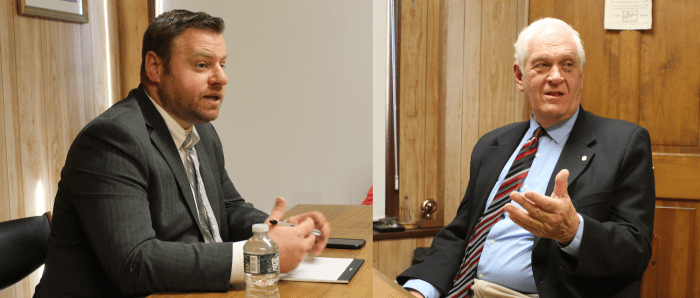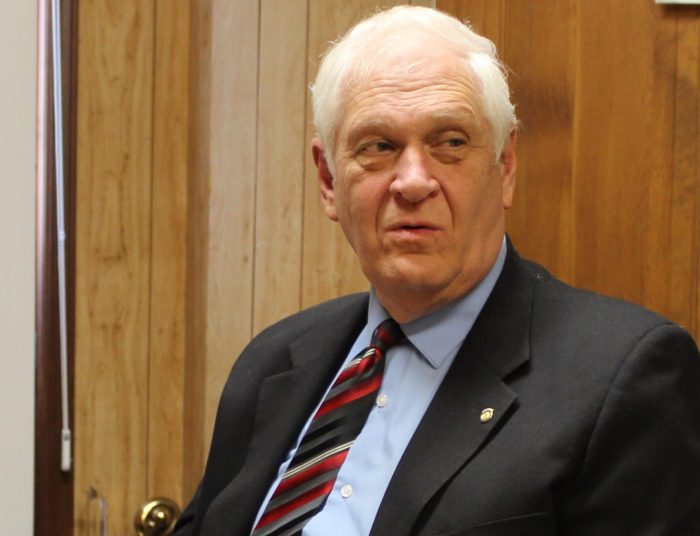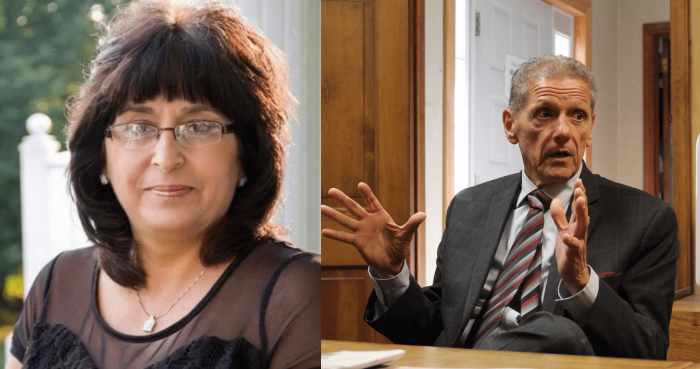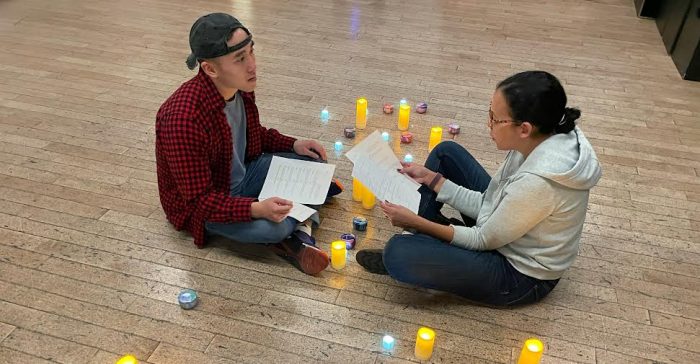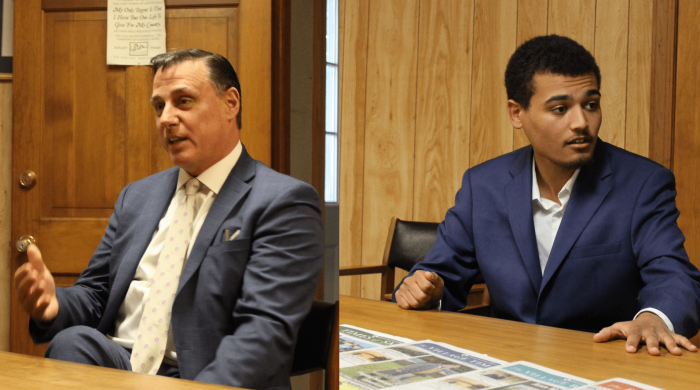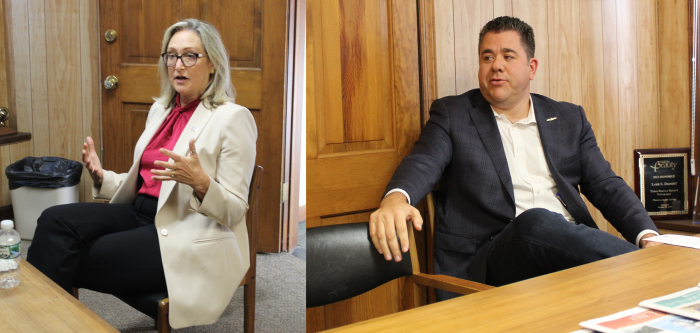In New York’s 4th Assembly District race, incumbent Steve Englebright (D-Setauket) is up against Republican Party challenger Edward Flood. During an office debate with TBR News Media, the two candidates confronted various issues, from affordability to the environment, prescription drug costs and more.
Introductions
Before entering government, Englebright was a trained geologist, museum curator and educator. He served as a Suffolk County legislator and then ran for the state Assembly, where he has served since 1992.
He is chair of the Assembly’s Committee on Environmental Conservation. He said he is running for reelection to continue his work promoting clean air and water, among other legislative issues.
Flood is a practicing attorney based in Port Jefferson. He is also an assistant town attorney for the Town of Brookhaven, where he tries quality-of-life cases and environmental crimes. He said he is running because he has observed changes in the area’s cost of living and heightened public safety concerns, and seeks to rectify those issues.
LIRR electrification
On the subject of electrifying the Port Jefferson Branch line of the Long Island Rail Road, Englebright advanced his multiphased approach. First is cleaning up any remaining contamination of the Lawrence Aviation Superfund site, a 126-acre property at the core of the electrification plan.
The assemblyman then favors moving the terminus of the North Shore line onto the Superfund site, enabling a new rail yard to support the electrification process.
“At this point, we have something that has transformational potential for the entire region,” he said. “We should be looking at this as what it is, which is a regional, statewide and even national model.”
Flood agreed with Englebright, referring to electrification as “the common sense thing to do.”
“It’s kind of a win-win because it will reduce contaminants going into the air … and it will also help speed up the process of getting rid of the Superfund site,” he said. “Like any other project with the MTA, the MTA drags their feet.” The challenger added, “I think we get the short end of the stick with them as Suffolk County residents, where they like to have our money but don’t like to give us a seat at the table.”
Declining student enrollment
One of the critical issues facing policymakers of this region is declining student enrollment in school districts throughout the area.
For Englebright, attracting families with students requires cutting costs where possible. He cited the Comsewogue School District, which put solar panels on top of the Terryville Road Elementary School, as an example of exploring creative ways to limit costs within the district.
“That was an experiment of sorts,” the assemblyman said. “That installation was completed in ‘96. Today it’s saving that school district $40,000 a year, just that one roof.”
Flood held that attracting and keeping families with children on Long Island is a matter of lowering the cost of living.
“I think that’s the overwhelming reason why you’re seeing a decrease in enrollment,” he said. “The only way that’s going to change is if we can make Long Island a more affordable place for the youth to stay. … We have to make Long Island more affordable so people can afford to raise families here.”
Affordable housing
The problem of affordability is not limited to the youth, according to Englebright. He advocated expanding affordable housing options to those living beyond or entering retirement age.
“Part of the housing issue is not only providing housing for young people but also for the pioneers of suburbia who now have three or four empty bedrooms in the house,” he said. “They need housing opportunities that will, in turn, enable them to stay in the community, so we don’t lose them.”
To remedy the housing and unaffordability problem, Flood supported exploring more opportunities for mixed-use development. “We do need to find cheaper housing,” he said. “Going to a Fairfield, or something like that, where they’re just going to build these giant complexes and charge astronomical fees … doesn’t really do much for our community.”
Englebright added that the housing crisis is linked to the ability of Albany to support the creation of new jobs. “The issue of housing continues to be a barrier,” he said. “The antidote to that is developing new jobs so that people can afford to stay. Too many young people are just priced out.”
For Flood, the state government can support local communities by lowering taxes. “I do believe on a statewide level that we can reduce the tax burden by canceling contracts that are no longer effective, doing a better job with how we spend money,” he said.
Prescription drugs
Flood was given the opportunity to respond to a letter to the editor published last month criticizing his platform on prescription drugs. [See letter, “Flood’s dangerous rhetoric on prescription drugs,” The Port Times Record ePaper, Oct. 6.]
Responding to this critique, Flood said his platform acknowledges the realities of business. “The only way to reduce the cost to the citizenry is to reduce some of the costs to the manufacturer,” he said. “Obviously, you can sue — and you can still sue for massive amounts — but the insurance for what pharmaceutical companies are paying is astronomical.”
He added, “It’s not saying that the individual, if there was an issue, wouldn’t be compensated. It would just be that it’s a common-sense measure to say that they can’t increase the cost to the pharmaceutical companies so much that they have to, in turn, turn it around on you [the consumer].”
Englebright retorted Flood’s position: “My distinguished opponent is obviously biased toward business,” the assemblyman said. “I was not surprised by the answer, but what we really need is, if we’re going to have a benefit of doubt, it should be in the direction of the consumer.”
Environment
The candidates debated some of the pressing environmental phenomena unique to the area. Englebright firmly supported the continued preservation of open spaces.
“If you preserve open space in a community plan, that allows open space to give its benefits, including environmental benefits to nearby streams from runoff,” he said. “Many of the woodlands that have not been built [upon] deserve preservation.”
Tangentially related, communities along the North Shore are experiencing the effects of eroding bluffs and cliffs. Most notably, the Village of Port Jefferson is deciding on a proper action plan concerning the village-owned country club atop the East Beach bluff.
Englebright did not favor manmade efforts to armor these bluffs. “The entire coastline is a dynamic reality,” he said. “Port Jefferson would be wise to reconsider the advice that they’ve been given by the engineers that they’ve hired. Engineers tend to think they can fix it.”
He expressed his support for the upcoming $4.2 billion state environmental bond act: “We need that money. About a third of it will be for coastline stabilization and activities that are related to climate change.”
Flood also supported the bond act, stating, “I agree with the bond act, and I agree we need something to step in.”
As for the eroding cliffs, he said he would follow the expertise of scientists. “I would rely a lot upon the advice of those people who are scientists, the people who work in this field every day and come up with a solution.”
Partisanship/polarization
In a period of intense partisanship and polarization at all levels of government, the candidates offered their favored approach to working across party lines and building common ground.
Flood said many issues confronting the state government do not lend themselves to vehement policy disagreements. He attributed the lack of bipartisanship to an inability of legislators to treat each other with respect.
“At the end of the day, people want safe streets, they want economic opportunity for their children, people want clean water and clean air, people want an ability to advance their careers,” Flood said. “Two people are able to sit across the table from each other and express their ideas. Maybe they don’t agree, but they can do it in a fashion that is respectful of each other.”
Englebright said his record indicates that he “keeps an eye on the prize,” not allowing partisanship to get in the way of progress for his constituents. He invoked his productive working relationship with former state Sen. Ken LaValle (R-Port Jefferson) as the kind of work that can occur when policymakers check their party affiliation at the door.
“The prize is getting things done for the people that sent you [to Albany],” he said. “I actually enjoy working across the aisle. When Senator LaValle was there, we did a whole variety of really important bills.”
The assemblyman added, “If somebody is also willing to pursue the objective of the overarching public benefit and set partisanship aside, I will be the first to work with them.”
Voters will decide upon their preferred state Assembly candidate for the 4th District on Tuesday, Nov. 8.

